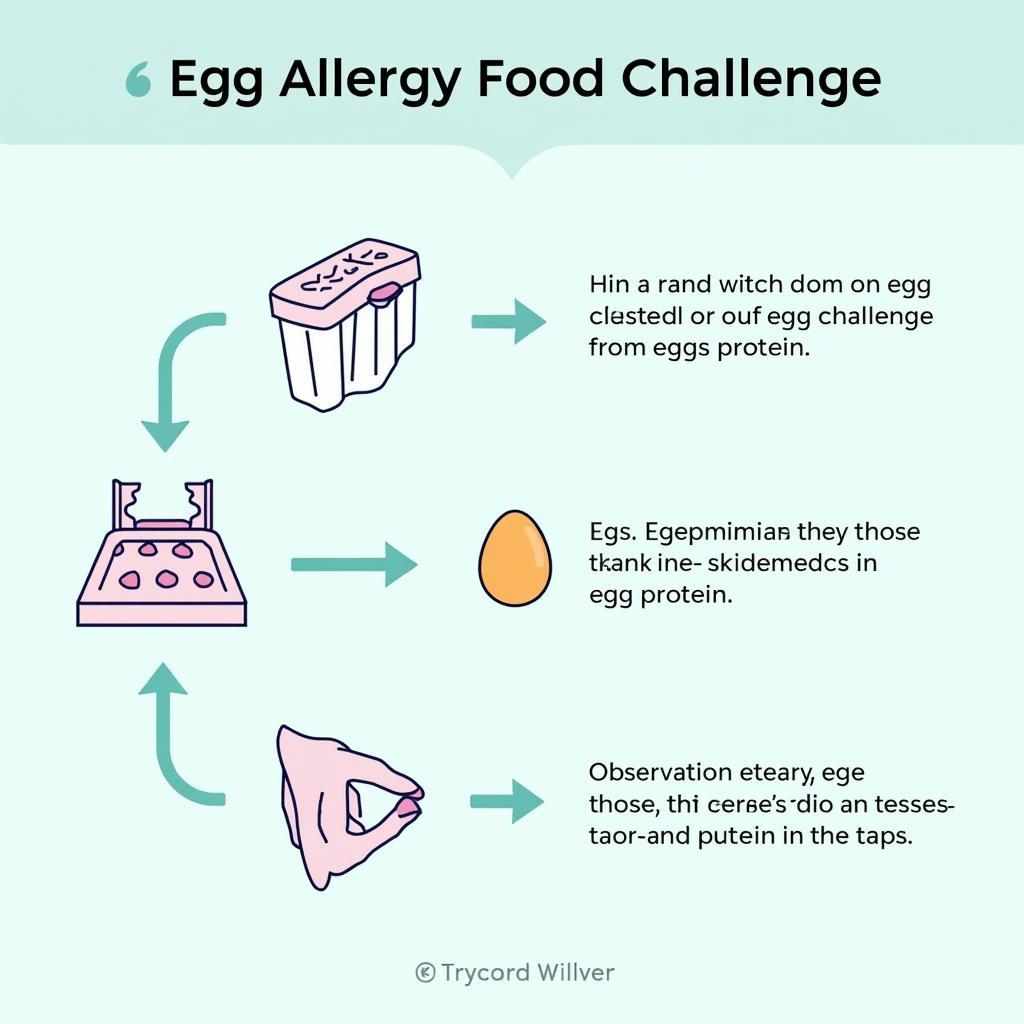The Egg Allergy Food Challenge is a medically supervised procedure used to determine if a person with a suspected or diagnosed egg allergy can tolerate eggs. This procedure involves gradually introducing increasing amounts of egg protein under the watchful eye of a medical professional. In this comprehensive guide, we’ll delve into the intricacies of the egg allergy food challenge, covering everything from its purpose and procedure to the risks and benefits. Let’s explore what an egg allergy food challenge entails and how it can impact those living with egg allergies. You can find more information on food allergies on our food allergy blog.
Understanding the Egg Allergy Food Challenge
An egg allergy food challenge is a structured process designed to assess an individual’s tolerance to egg protein. It’s typically conducted in a clinical setting under the supervision of an allergist or other qualified healthcare provider. This controlled environment ensures the patient’s safety and allows for immediate medical intervention if a reaction occurs. The challenge can provide definitive answers about a person’s egg allergy status and help determine the next steps in their management plan.
Why is an Egg Allergy Food Challenge Performed?
An egg allergy food challenge serves several crucial purposes:
- Confirming an Egg Allergy: The challenge helps confirm whether a person is truly allergic to eggs or if their symptoms are caused by something else.
- Assessing Allergy Resolution: For individuals previously diagnosed with an egg allergy, the challenge can determine if they have outgrown the allergy.
- Determining the Severity of the Allergy: The challenge can help determine the threshold of egg protein that triggers a reaction, providing insight into the allergy’s severity.
How is the Egg Allergy Food Challenge Administered?
The egg allergy food challenge is a carefully structured process, usually conducted in stages. The process typically involves:
- Skin Prick Test: A small amount of egg protein is placed on the skin and pricked with a needle to check for an immediate reaction.
- Oral Food Challenge: If the skin prick test is negative or inconclusive, the patient is given gradually increasing amounts of egg protein to eat or drink, starting with a very small dose.
- Observation Period: After each dose, the patient is observed for any allergic reactions, which can range from mild (hives, itching) to severe (anaphylaxis).
- Medical Supervision: Throughout the entire process, the patient is closely monitored by medical professionals who are prepared to administer treatment if a reaction occurs.
 Stages of the Egg Allergy Food Challenge
Stages of the Egg Allergy Food Challenge
Benefits and Risks of the Egg Allergy Food Challenge
Like any medical procedure, the egg allergy food challenge carries both benefits and risks.
Benefits
- Confirmation of Diagnosis: Provides a definitive diagnosis, helping individuals understand their condition and manage it effectively.
- Potential for Dietary Expansion: If the challenge is successful, it can allow individuals to reintroduce eggs into their diet, increasing nutritional variety. If you are interested in learning more about dog food allergies, visit our page on goldendoodle food allergies.
- Reduced Anxiety: A successful challenge can alleviate anxiety surrounding accidental exposure to eggs.
Risks
- Allergic Reaction: The most significant risk is the potential for an allergic reaction, which can range in severity. Learn more about managing food allergies with an Illinois food allergy emergency action plan.
- Discomfort: Some individuals may experience mild discomfort, such as itching or hives, even if they don’t have a severe reaction.
- Emotional Stress: The challenge can be emotionally taxing for both the patient and their family, especially if the outcome is uncertain.
Dr. Amelia Hernandez, a renowned allergist, emphasizes, “While the egg allergy food challenge can be daunting, it’s a crucial tool for accurate diagnosis and management of egg allergies. It allows us to provide personalized care based on the individual’s specific needs.”
Preparing for an Egg Allergy Food Challenge
Preparation is key to a successful and safe egg allergy food challenge. This includes:
- Consulting with an Allergist: Discuss the procedure thoroughly with a qualified allergist to understand the risks, benefits, and expectations.
- Medical History Review: Provide a detailed medical history, including any previous allergic reactions, medications, and other relevant health information.
- Medication Review: Inform your allergist about any medications you are currently taking, as some medications may interfere with the challenge.
- Fasting: You may be asked to fast for a certain period before the challenge.
 Preparing for an Egg Allergy Food Challenge
Preparing for an Egg Allergy Food Challenge
Conclusion
The egg allergy food challenge is a valuable tool for diagnosing and managing egg allergies. It allows for accurate assessment of an individual’s tolerance to egg protein and can significantly impact their quality of life. While there are inherent risks, these are minimized by careful medical supervision and thorough preparation. Understanding the process, benefits, and risks is essential for anyone considering this challenge. For a deeper understanding of food allergies, explore our dog treats dog food and naturally nutty foods resources.
FAQ
- Who is a candidate for an egg allergy food challenge? Individuals with a suspected or diagnosed egg allergy may be considered.
- How long does the challenge take? The challenge can take several hours, including the observation period.
- What happens if I have a reaction during the challenge? Medical professionals are on hand to administer treatment immediately.
- Can I do the challenge at home? No, the challenge must be conducted under medical supervision.
- How much does an egg allergy food challenge cost? The cost varies depending on the location and healthcare provider.
- What if I have other food allergies? This should be discussed with your allergist to determine the best course of action.
- How often is the challenge repeated? The frequency of repeat challenges depends on the individual’s specific circumstances.
Common Scenarios and Questions
- My child has mild eczema. Could it be related to eggs? It’s possible. Consult an allergist for diagnosis.
- I used to be allergic to eggs, but I haven’t had a reaction in years. Can I eat them now? Don’t reintroduce eggs without consulting an allergist and potentially undergoing a food challenge.
Further Resources
Explore other related articles on our site, such as those focusing on specific food allergies and allergy management plans.
For support, contact us at Phone Number: 02437655121, Email: [email protected], or visit our address: 3PGH+8R9, ĐT70A, thôn Trung, Bắc Từ Liêm, Hà Nội, Việt Nam. We have a 24/7 customer support team.